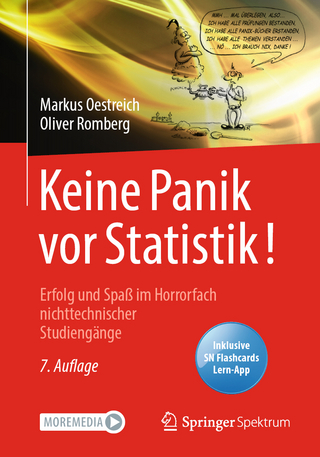
Partial Least Squares Path Modeling
Springer International Publishing (Verlag)
978-3-031-37771-6 (ISBN)
Now in its second edition, this edited book presents recent progress and techniques in partial least squares path modeling (PLS-PM), and provides a comprehensive overview of the current state-of-the-art in PLS-PM research. Like the previous edition, the book is divided into three parts: the first part emphasizes the basic concepts and extensions of the PLS-PM method; the second part discusses the methodological issues that have been the focus of recent developments, and the last part deals with real-world applications of the PLS-PM method in various disciplines.
This new edition broadens the scope of the first edition and consists of entirely new original contributions, again written by expert authors in the field, on a wide range of topics, including: how to perform quantile composite path modeling with R; the rationale and justification for using PLS-PM in top-tier journals; psychometric properties of three weighting schemes and why PLS-PM is a better fit to mode B; a comprehensive review of PLS software; how to perform out-of-sample predictions with ordinal consistent partial least squares; multicollinearity issues in PLS-PM using ridge regression; theorizing and testing specific indirect effects in PLS and considering their effect size; how to run hierarchical models and available approaches; and how to apply necessary condition analysis (NCA) in PLS-PM.
This book will appeal to researchers interested in the latest advances in PLS-PM as well as masters and Ph.D. students in a variety of disciplines who use PLS-PM methods. With clear guidelines on selecting and using PLS-PM, especially those related to composite models, readers will be brought up to date on recent debates in the field.
lt;p>Hengky Latan currently serves as research director at the FTD Institute and senior researcher at HLC Consulting. He has authored over 15 books, including Covariance Structure Analysis, PLS Path Modeling and Generalized Structure Component Analysis for Structural Equation Modeling approaches and several multivariate analysis books using IBM SPSS and Stata. He is also the Editor-in-Chief of the edited book on PLS-PM published by Springer (Cham). His current research addresses business ethics, sustainability, human resource management, innovation and quantitative methods. He has published over 45 articles, most of them in leading international journals such as the Journal of Business Ethics, Human Resource Management Journal, International Journal of Production Economics, Ecological Economics, Technological Forecasting & Social Change, Journal of Business Research, Journal of International Management, and others. He frequently publishes in FT50, CABS4, CNRS1 and FNEGE1 journals. According to Google Scholar, his works have been cited more than 12,500 times (H-Index = 43) in just 8 years of his academic career.
Joseph F. Hair, Jr is the Director of the Ph.D. Program in Business Administration, Mitchell College of Business, University of South Alabama, U.S.A. He is ranked #1 globally in Multivariate Data Analysis, SEM, and PLS-SEM, and his career citations exceed 340,000, with H-Index 109 and I-10 461. He has co-authored over 100 editions of his books, including: Multivariate Data Analysis (2019); Essentials of Business Research Methods (2023); A Primer on Partial Least Squares Structural Equation Modeling (2022); Advanced Issues in Partial Least Squares Structural Equation Modeling (2023); A Primer on Partial Least Squares Structural Equation Modeling: R Version (2021); and Essentials of Marketing Analytics (2024). He has published over 160 articles in scholarly journals such as the Journal of Marketing Research, Journal of Academy of Marketing Science, Organizational Research Methods, Harvard Business Review, European Journal of Marketing, Journal of Family Business Strategy, European Management Journal, and others.
Richard Noonan, studied Economics of Education at Columbia University, NY (Ed.D.), and Stockholm University, Sweden (Ph.D.). He served as Research Officer with the International Association for the Evaluation of Educational Achievement (IEA) and later as Associate Professor at the Institute of International Education, Stockholm University, Sweden. As an education economist, he served as consultant to UNESCO, World Bank, Asian Development Bank, the International Labour Organization, and many other multilateral and bilateral international development agencies. He has published numerous articles and several books on education systems, with an emphasis on quantitative analysis, including the use of PLS in the analysis of education and training systems. He retired in 2012 and devotes his time to writing.
Introduction to the Partial Least Squares Path Modeling: Basic Concepts and Recent Methodological Enhancements.- Quantile Composite-Based Path Modeling with R: A Hands-On Guide.- Use of Partial Least Squares Path Modeling within and across Business Disciplines.- Statistical and Psychometric Properties of Three Weighting Schemes of the PLS-SEM Methodology.- Software Packages for Partial Least Squares Structural Equation Modeling: An Updated Review.- Revisiting and Extending PLS for Ordinal Measurement and Prediction.- Multicollinearity: An Overview and Introduction of Ridge PLS-SEM Estimation.- Demystifying Prediction in Mediation Research and the Use of Specific Indirect Effects and Indirect Effect Sizes.- Alternative Approaches to Higher-Order PLS-Path Modeling: A Discussion on Methodological Issues and Applications.- How to Apply Necessary Condition Analysis in PLS-SEM.- New Insights for Public Diplomacy Using PLS-SEM to Analyze the Polyphony of Voices: Value Drivers of the Country Image in Western European and BRICS countries.- To Survive or Not to Survive: Findings from PLS-SEM on the Relationship between Organizational Resources and Startups Survival.- Influence of Earnings Quality Dimensions on the Perception of Earnings Quality: An Empirical Application of Composite PLS using Archival Data.- Importance Performance Map Analysis of Capital Structure Using PLS-SEM: Evidence from Non-Financial Sector.
| Erscheinungsdatum | 16.11.2023 |
|---|---|
| Zusatzinfo | XXXVI, 472 p. 90 illus., 28 illus. in color. |
| Verlagsort | Cham |
| Sprache | englisch |
| Maße | 155 x 235 mm |
| Gewicht | 919 g |
| Themenwelt | Mathematik / Informatik ► Mathematik ► Wahrscheinlichkeit / Kombinatorik |
| Schlagworte | Applications of PLS-PM • Applications of PLS-SEM • Composite-based Path Modeling • Importance-Performance Map Analysis • multivariate analysis • Necessary condition analysis • Non-parametric Inference • Partial Least Squares • partial least squares path modeling • Partial Least Squares Structural Equation Modeling • PLS • PLS-PM • PLS-SEM • PLS Software • predictive path modeling • Structural Equation Modeling |
| ISBN-10 | 3-031-37771-0 / 3031377710 |
| ISBN-13 | 978-3-031-37771-6 / 9783031377716 |
| Zustand | Neuware |
| Haben Sie eine Frage zum Produkt? |
aus dem Bereich


